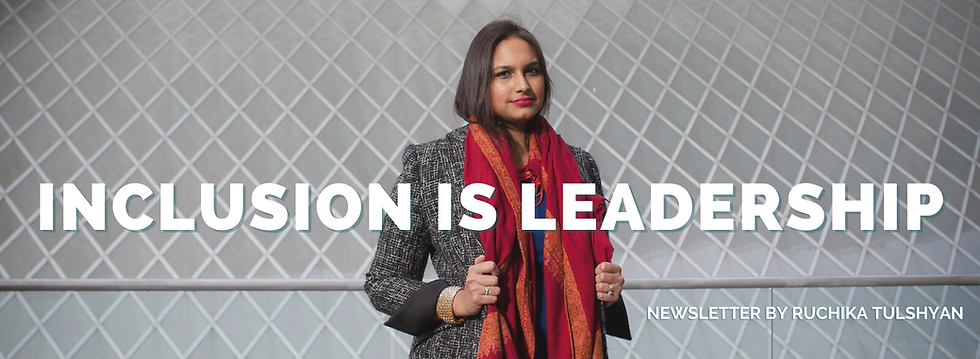Note to Self: Workplace Burnout Is Not Normal
- Ruchika T. Malhotra
- Jun 1, 2021
- 3 min read

I recently saw a tweet (from 2019) that captured what I’ve observed everywhere in the past year:
Bone-tired exhaustion.
I’m observing this in peers, friends, loved ones and most of all, myself. Even on good days, when I’m working on things that give me joy, when I have a village to help with childcare, when life seems to cooperate, I feel like I’m permanently exhausted.

Tweet in words:
"Anyone can be tired.
You don't need to have kids, work 80 hours a week, have just finished your third degree, or have just recovered from a bad illness.
You don't have to prove to anyone why you're exhausted and tired. I hope you can get some rest and feel better soon."
In our workplaces, this chronic stress is reaching alarming proportions. When 53% of women say their mental health is suffering to the point of burnout because of their jobs, we should listen.
When nearly 10 million working women in America–disproportionately women of color–say they’re experiencing workplace burnout, we should listen.
And yet, and yet. The expectation to grind continues.
Honestly, I just thought being tired to the point of daily, hourly exhaustion was just part of...adulting. I hadn’t even assessed burnout in my own life until I interviewed my childhood friend, surgeon Dr. Yumiko Kadota, for the New York Times.
We spoke after 20 years while I was quarantining in a hotel room in Singapore after a week of not seeing another human being in person. Being alone in a room, responsible only for myself, held up a mirror to how much of my regular life was overstretched.
Anyway.
Yumiko (but please, do call her Dr. Kadota if you refer to her, here’s why) and I had a candid conversation about what workplace burnout really means.
It was eye-opening. She talked about working 100 hour weeks, and being called an “emotional female” (the title of her fantastic memoir) when she pushed back against being woken up at 3 A.M. to confirm a non urgent surgery. Her book details galling sexism and racism, despite outperforming her peers in every way as a rockstar surgeon.
But what really made me sit up straight, mouth agape, is when she told me the feedback she got when she brought up how overworked she was to managers: “you need to toughen up and deal with it.”
I heard variations of this as a young journalist, I heard it in tech all the time, and even now, as an entrepreneur, the idea that “you can sleep when you’re dead” is alive and sniggering.
But the truth is if we don’t sleep enough, we’re digging an early grave. Literally, a new study finds working more than 55 hours a week can lead to premature death.
Everyone who works with anyone else, especially if you manage folks, needs to encourage others and ourselves to take a break. After hearing my “fiesty” (read the significance of this in the NYT interview) childhood friend recount the horrors of overwork, losing control of her gut, chronic insomnia that led to hospitalization, mental health traumas too deep to recount in any article, I realized that could be anyone.
It could be you or me. For those of us who wear other marginalized identities, women, people of color, parents, people with disabilities etc...the burden to prove ourselves by overworking is even more pronounced.
When Yumiko talked about having her job once define her identity, like I still do, I could only think of the heartbreak when your job doesn’t love you back.
And I don’t want that for anyone.
Workplace burnout is not a “woman’s issue,” either. It’s everybody’s issue.
I want to see more leaders talk about it, get trained in recognizing it in your people and be accountable for creating a workplace culture that doesn’t expect people to be overworked to the point of burnout. And model taking breaks instead of glorifying how long you worked.
As someone who reports to myself, I have to create the structure for myself. I’m building in time off monthly, which I know is a privilege. It’s the only way I can carry on.
How have you addressed workplace burnout?

Is “sleep when you’re dead” hurting your workforce? My talks address how to change your workplace culture to be more… human. Ideal for keynotes, company meetings, and ERGs, I'd be happy to come to your workplace (virtually, for now) to present to your team. Book me to speak.
.png)



Comments